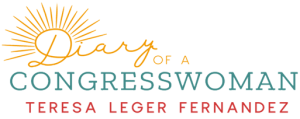Mary-Charlotte Domandi:
Today, it was announced that you are now chair of the house, natural resources subcommittee for indigenous peoples of the United States. First of all, congratulations.
Teresa Leger Fernandez:
I do. It’s pretty neat. I mean, it’s really wonderful to be able to get a subcommittee chair as a freshman. Deb Haaland also did in her freshman term, but it’s not—I’m the only freshman in my class who has a subcommittee chair.
MCD:
So what does it mean both, what is this subcommittee? Civics lesson, ladies and gentlemen. Let’s talk about that first, then we’ll talk about some of the issues.
TLF:
So the way the Congress works is it divides its work up into various committees. And then within those committees it divides it up further because there is so much work to do. So I am a member of the natural resources committee. I will vote on everything that comes out of that committee. Anything dealing with the BLM, oceans, public lands. And natural resources also has jurisdiction over issues dealing with Native Americans. Because if you think about it, natural resources has jurisdiction over things dealing at the department of interior. And that is where the BIA is located.
MCD:
BIA, Bureau of Indian affairs.
TLF:
Bureau of Indian affairs. And so this committee is the subcommittee on indigenous peoples. It also covers Native Americans. It covers Alaska natives. So what a subcommittees often do is they will divvy up the work of a committee and you will work on things in the subcommittee so that there’s more expertise on the subcommittee level on issues.
And that’s where you will talk about bills and you might mark up bills, and then you’ll take them to the greater committee level. And then the committee makes the final decisions, and then it goes to the floor in general in Congress, usually things go only to one committee and then to the floor. It’s not like in the state of New Mexico, you can tell whether the bill is going to die or not if it gets too many committee assignments. In Congress, there’s pretty clear jurisdiction. There sometimes overlap. For example, the affordable care act, there was a lot of overlap, and different committees had different pieces of it. And then they put it back together into one bill—rather than making the one bill hop around from one committee to the next, which is what we do in New Mexico.
MCD:
And so all of that, what it really boils down to where indigenous people are concerned is a centuries–long history of broken treaties and maltreatment. And here you are, having spent your pretty much entire career as an advocate for native people in New Mexico, so what does this mean? Like what are some of the things actually at stake?
TLF:
So what we’re going to be doing in our subcommittee is taking up the issues to remedy those broken treaties. So we will be taking up issues that say, we have failed in our trust responsibility. We have a responsibility of trust. That’s the language that’s used, and what a beautiful language of trust. We entered into agreements between tribes and the nation, and they placed their trust in the United States. And the United States had a trust obligation to provide education, to provide healthcare, and they have failed. And they have failed in a wide range of things. And so what we need to start doing now is remedying that failure. We need to start providing full funding for the Indian health services. We need to start honoring sacred sites and not destroying them and drilling for oil under them. So just a wide range of work that we will be doing that begins with an understanding that there needs to be respect between the tribes and the federal government, and that they need to work on what we call a government to government relationship.
So one of the bills we’ll take up is called the Respect Act, which actually says, this is the foundation of how we’re going to treat each other. So really sometimes it goes to that foundational matter. It goes to the fact of there’s been wonderful work that secretary nominee, Deb Haaland has done with missing and murdered indigenous women. I’ll take up those bills. As I mentioned, in Hawaii they’ve been really mistreated, the native Hawaiians. And we want to address those issues. So there’s lots of different work that we will take up. In a sense, the long explanation is, a subcommittee provides more expertise on a more limited area that then goes to the larger committee. And so my subcommittee will spend its time looking with particular expertise at issues around Native Americans, indigenous people throughout the United States. We might also because of that relationship sometimes look at how do we have interactions with indigenous people in other countries as well.
MCD:
One of the most front and center issues of course is mining or extraction of various kinds. As you mentioned, it’s not just about the problems of drilling under sacred sites. It’s all kinds of extraction, issues of pipelines and who gets to decide what land is exploited.
TLF:
That committee on natural resources, will be looking very hard at issues of mining and the extractive industries. They are ready to take a good hard look at the BLM, the Bureau of Land Management. And it’s the Bureau of Land Management that actually issues a lot of those leases and permits. So you’re going to see in the next two years, a lot of questions being answered about what is the best use of our public resources, and are those public resources being used in a manner that preserves a future for ourselves. And sometimes their thinking has been way too short-term, for short gain, and not thinking about our public lands needing to be preserved and providing for our people, the American people, into the future.
MCD:
Specifically, are you talking about like fracking, other kinds of extraction.
TLF:
All of those will be addressed in the natural resources committee, yes.
MCD:
Do you have a position at this point?
TLF:
We’re going to address all of those issues. And we’re going to be saying, is this the wisest use of our common good? Is this exacerbating our climate crisis? Or is this solving it? You know, when you start asking the question this way, maybe there is some drilling that should go on and maybe there is a lot of other drilling that shouldn’t. Maybe we need to make sure that the range of things we’re going to need to do from making sure there is adequate bonding, so that these companies don’t then just up and leave and leave us with an environmental mess, that we know what is going into fracking, that we are not using good water, wasting a very valuable resource. So all of those will be questions that will be asked and you will be seeing legislation coming out of the natural resources committee, dealing with those very difficult questions.


